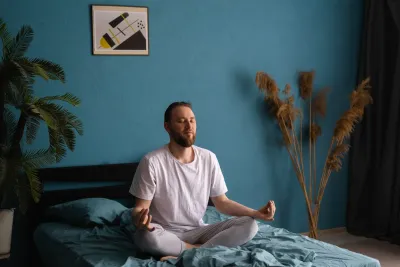
Key Takeaways
Sleep meditation helps quiet racing thoughts and calm the nervous system, making it easier to fall asleep and stay asleep.
- Meditation for sleep uses techniques like slow breathing, guided imagery, and body scans to shift the brain out of stress mode and into rest.
- Mindfulness practices have been shown to reduce insomnia symptoms, shorten sleep onset time, and improve overall sleep quality.
- Sleep meditation supports the mind body connection by lowering heart rate and relaxing muscle tension that often keeps people awake.
- Getting started is simple and accessible, requiring only a quiet space and a few minutes of focused breathing or guided audio.
- Pairing meditation with a cool, comfortable sleep environment, including temperature regulating systems like the Chilipad Dock Pro, can further support deeper and more restorative sleep.
Meditation has turned into a wellness buzzword. You’ve probably have heard a lot about it, but have you tried meditation before bed? It’s common for you to feel that it’s not for you, you don’t have enough time, you can’t do it or you don’t need it. But we encourage you to give it a try.
Today, there are different types of meditation, and you can find one that’s perfect for you and your goals. Also, it became popular for a reason: the many benefits it provides for mind-body wellness. Daily meditation can significantly improve sleep quality and help manage stress-related disorders.
It’s worth trying to see if it makes a difference in your life, and, most importantly, helps you achieve a good night’s sleep.
This practice is simple to start, and there are short sessions for everyone to try.
What Is Meditation?
Ultimately, meditation involves certain techniques designed to focus and clear the mind, creating a state of calm and quiet.
Experts from the National Institutes of Health's Center for Complementary and Integrative Health note commonalities between different types of meditation, including getting into a comfortable position in a quiet area, focusing your mind, and being open to the experience without judgment. [1]
This overview isn't more specific because there are many types of meditation, so let's get into that next.
Wake Up Refreshed with Meditation & Chilipad Dock Pro
Incorporate meditation into your bedtime routine and experience the powerful benefits of the Chilipad Dock Pro. Together, they create the perfect environment for deep, quality sleep, helping you wake up refreshed and energized.
Understanding Sleep Difficulties
Sleep difficulties are common issues that affect many people’s overall well-being and quality of life. Whether it’s trouble falling asleep, staying asleep, or waking up feeling unrefreshed, these challenges can significantly impact physical and mental health.
Poor sleep can lead to increased stress, anxiety, and a weakened immune system, making it essential to address these issues for a better night’s rest.
One primary reason people struggle with sleep is their inability to quiet their minds. Racing thoughts, worries, and stress can keep the mind active, making it difficult to relax and drift off to sleep. Meditation for sleep can help.
By incorporating meditation for sleep into your bedtime routine, you can calm your mind, reduce stress, and create a sense of peace that promotes restful sleep. Meditation can also be particularly beneficial for those suffering from chronic insomnia, as practices like mindfulness meditation and yoga nidra have been shown to improve sleep quality.
Understanding the root causes of your sleep difficulties is the first step towards finding effective solutions. By recognizing the factors that contribute to poor sleep, you can take proactive steps to address them and improve your sleep quality.
Meditation, combined with healthy sleep habits, can be a powerful tool for achieving a good night’s sleep. Evidence suggests that guided sleep meditation and mindfulness meditation can significantly enhance sleep quality, working alongside other healthy sleep practices to improve overall sleep outcomes.
There are various types that can help improve your sleep quality.
Moving Meditation
This practice involves focusing on slowly moving the body within a routine. It's a great way to wind down before bed, as it can help calm your mind and body, promote better sleep, and help you fall asleep faster.
Unlike traditional meditation, which involves stillness, moving meditation incorporates slow, intentional movements.
This type can be a terrific option, particularly if you get restless quickly. When practicing moving meditation, you move intentionally, focusing on every step and each breath.
Below are a few suggested ways to try it.
- Gardening
- Walking
- Running
- Dancing
- Qi Gong
- Tia Chi
Guided Meditation
Unlike silent meditation, guided meditation provides a structured approach that makes it accessible and appealing to those who may find the absence of silence intimidating or who benefit from specific topics and skills.
Guided sleep meditation, in particular, can significantly improve sleep quality by combining meditative practices with other healthy sleep habits, making it a valuable tool for those experiencing anxiety or depression.
How does it work? A person leads you through various meditation techniques, such as deep breathing exercises, visualizations, body scans, and more. Their voice and instructions offer a focal point, helping the practitioner concentrate on the present moment and the specific goals.
There are various guided meditations for anxiety, including a 5-minute Box Breathing exercise.
Mindfulness Meditation
You notice and pay attention to your thoughts and observations without judgment. Practicing mindfulness meditation can be an effective way to manage feelings of stress and anxiety while helping with relaxation and achieving a good night's rest.
This practice combines awareness and concentration and can be done alone. Additionally, it appears to help improve your sleep quality. [2]
Sleep Study: A recent study showed that mindfulness meditation reduced the inflammatory responses caused by stress. [3]
Body Scan Meditation
It’s a powerful technique that can help improve sleep quality by relaxing the body and calming the mind. This type of meditation involves lying down or sitting comfortably and bringing awareness to different parts of the body, starting from the toes and moving up to the head.
Body scan meditation involves focusing on each muscle group to promote relaxation. By focusing on each area, you can release tension, relax muscles, and quiet the mind.
To practice body scan meditation for better sleep, follow these steps:
- Find a quiet and comfortable place to lie down or sit.
- Close your eyes and take a few deep breaths to calm your mind and body.
- Bring your attention to your toes and notice any sensations, feelings, or thoughts without judgment.
- Gradually move your attention up through your body, scanning each area, including your feet, ankles, calves, knees, thighs, hips, back, shoulders, arms, hands, neck, and head.
- As you focus on each area, release any tension, relax your muscles, and let go of any thoughts or worries.
- Continue scanning your body for 10-15 minutes, taking deep breaths and maintaining a relaxed state.
- When you’re ready to fall asleep, slowly open your eyes, and take a few more deep breaths before drifting off to sleep.
Regular body scan meditation practice can help you:
- Relax your body and calm your mind
- Reduce stress and anxiety
- Improve sleep quality and duration
- Increase feelings of relaxation and calmness
- Enhance overall well-being and mental health
By adding it to your nightly routine, you can create a peaceful transition from wakefulness to sleep, ensuring a restful night’s sleep and better overall sleep quality.
Yoga Meditation
You focus your attention on moving your body into different yoga postures and then allow yourself to calm your mind during poses like sitting cross-legged in Easy Pose or while lying flat on your back in Corpse Pose.
If you're interested in learning more, read more about yoga's benefits and how to get started.
Progressive Relaxation
This involves starting at your feet or head as you intentionally tighten and then relaxing each part of your body at a time, aiming to fully relax each part of the body as you go. Progressive relaxation can be used to unwind before bedtime and relieve stress.
This technique engages the parasympathetic nervous system to counteract the sympathetic nervous system, fostering relaxation and alleviating stress levels.
The above mentions are just a few popular options. Whether you’re looking to reduce stress and anxiety, feel refreshed, or find spiritual enlightenment, you have options.
Which Meditation Is Right for You?
Overall, try any type that appeals to you. If one doesn't help you relax, try something else until you find a type you connect with. Adapt meditation to suit your needs. If you feel like you can't sit still, try a moving meditation or meditative yoga practice.
If you have limited mobility, you can instead get into a comfortable position and focus your mind or listen to a guided meditation. If you're frustrated during mindfulness practice, try focusing on the words instead.
The good news is that there's a type that is perfect for everyone.
The Benefits of Meditation for Sleep
Below, we've listed some of the powerful benefits of the different types to perform before bed, including how they can help you achieve a good night's sleep.
Emotional & Physical Well-Being
Scientific research backs up the benefits of meditation for your health and sleep. In particular, it’s shown to help with certain health conditions, anxiety, depression, and insomnia. Meditation can also be an effective approach for reducing stress.
- Can help reduce negative emotions
- Increase self-awareness
- Lower resting heart rate
- Improve sleep quality
- Help build skills to overcome stress by promoting a more relaxed response to stress
- and more
Meditation and Illness
It has the potential to be helpful for those with medical conditions, particularly those that can be exacerbated by stress.
Despite increasing scientific evidence supporting the health advantages of meditation, some researchers believe it is early to make definitive conclusions about the potential benefits.
Studies indicate that meditation may aid in symptom management for various health conditions, including:
- Cancer
- Sleep issues
- Headaches
- Depression
- Chronic Pain
- Anxiety
- and more
It is important to consult with your healthcare provider to assess the advantages and disadvantages of incorporating it into your daily routine, particularly if you have any of the above medical conditions or other health concerns.
Did You Know? Meditation is currently practiced by at least one in six adults, and over 14% have meditated at least once. [4]
One study noted that a specific type of meditation geared toward sleep, which is called mindfulness-based therapy for insomnia (MBTI), worked particularly well for insomnia compared to other meditation techniques used in the study. [5]
Nonetheless, other types of meditation for sleep showed benefits as well.
Related Blog: Beginners Guide to Yoga Nidra and How It Can Help You Sleep.
The primary focus of meditation is on calming the mind. Many people struggle to fall asleep because of incessant thoughts and worries running through their minds.
Meditation could help you learn to acknowledge those thoughts and let them go in the current moment in time.
You can learn to put aside your problems until the next day. With practice, this process becomes easier, helping you create a calm mind that facilitates sleep.
In addition, meditation provides an excellent pre-bed routine, allowing you to unwind, let go of the day and create a sense of stress relief and peace.
Supporting Sleep Meditation with Healthy Habits
While sleep meditation can be a powerful tool for improving sleep quality, it's essential to support it with healthy habits that promote restful sleep. Here are some tips to help you establish a sleep-conducive environment and develop healthy sleep habits:
- Establish a Consistent Sleep Schedule: To regulate your body's internal clock, go to bed and wake up at the same time every day, including weekends.
- Create a Sleep-conducive Environment: Make your bedroom a sleep sanctuary by making it dark, quiet, and cool. Invest in blackout curtains, earplugs, or a white noise machine if necessary. We've listed a few bedroom design tips to help make it better for sleep.
- Develop a Bedtime Routine: Engage in relaxing activities, including reading a book or magazine, meditation, or deep breathing exercises, to signal to your body that it’s time to sleep. Maintaining a conducive sleep environment, such as keeping the room cool, dark, and quiet, is also crucial for better sleep quality.
- Avoid or Limit Screens Time Before Bed: The blue light emitted from screens can suppress melatonin production, making it harder to fall asleep. Try to avoid screens for at least an hour before bedtime.
- Exercise Regularly: Regular physical activity can help improve sleep quality, but avoid vigorous exercise within a few hours of bedtime, as it can stimulate your body and brain.
- Avoid Stimulating Activities Late at Night: Limit or avoid activities that can stimulate your brain, such as watching TV, playing video games, or engaging in intense conversations, at least an hour before bedtime.
- **Explore New Relaxation Techniques: **Try other relaxation techniques, such as progressive muscle relaxation, bedtime yoga, or tai chi, to calm your mind and body before sleep.
- Limit Caffeine and Nicotine: Both caffeine and nicotine can disrupt sleep patterns and reduce sleep quality. Avoid consuming them in the hours leading up to bedtime.
- Get Morning Sunlight: Exposure to natural light in the morning helps regulate your circadian rhythms, which can improve sleep quality.
- Make Sleep a Priority: Prioritize sleep by allocating enough time for restful sleep each night and establishing a consistent sleep schedule.
Getting Started with Meditation
Getting started with meditation is easier than you think. Begin by finding a quiet and comfortable space to practice, free from distractions and interruptions. Start with short sessions, such as 5-10 minutes, and gradually increase the duration as you become more comfortable with the practice. You can use guided meditation audio tracks or apps to help you get started, or try practicing mindfulness meditation or mantra meditation on your own.
Remember to focus on your breath, a repeated phrase, or a physical sensation in your body, and gently bring your attention back to the present moment when your mind wanders. Regular practice of meditation can help improve sleep quality, reduce stress levels, and increase feelings of inner peace and well-being.
As you progress in your meditation practice, you can explore different meditation styles, such as transcendental meditation or visualization meditation, to find what works best for you.
Making Meditation a Habit
Making meditation a habit requires commitment and consistency. Start by incorporating meditation into your daily routine, such as first thing in the morning or before bed. Use a meditation app or guided meditation audio tracks to help you stay on track, and try to practice at the same time every day.
You can also try incorporating physical activities like yoga or tai chi into your routine, which can help promote relaxation and reduce stress levels.
As you make meditation a habit, you’ll find that it becomes easier to fall asleep, stay asleep, and wake up feeling more refreshed and relaxed. Remember to be patient and kind to yourself, and don’t get discouraged if you miss a day or two.
With regular practice, you can improve sleep quality, reduce sleep disturbance, and experience the many benefits of meditation, including increased emotional regulation, self-confidence, and overall well-being. By prioritizing meditation and making it a habit, you can take the first step towards a more restful and rejuvenating sleep experience.
Final Thought
Which is the best sleep meditation? Well, that's up to you.
Overall, meditation is a safe practice that is easy to try, and there's a type to fit every person. It doesn't have to be complicated, as even a quick session can provide endless benefits. Try deep breathing and calming the mind for just a few minutes to see how even something this simple can calm and de-stress you.
If you have trouble sleeping or simply want to create a better nighttime routine, consider adding a simple meditation session to your evening. We have a selection of free mindfulness meditations, the best sleep podcasts, and others that last 20 to 30 minutes each, designed to help you relax and get the best sleep possible.
Frequently Asked Questions About Meditation and Sleep
What Type of Meditation Is Good for Sleep?
Mindfulness meditation is a great type for improving sleep. It involves focusing on your breath and present moment sensations, such as the rise and fall of your chest. This practice can help calm your mind, reduce stress, and prepare your body for sleep.
Yogic sleep, also known as yoga nidra, is another beneficial practice that can improve sleep quality and reduce nighttime awakenings.
Other meditation techniques include Loving-kindness meditation and body scan meditation.
How Does Guided Meditation for Sleep Work?
Guided meditation for sleep works by calming the mind and body. When you're stressed or anxious, your mind may race, making it difficult to fall asleep. Guided meditation can help to slow down your thoughts and relax your muscles, making it easier to drift off to sleep.
What Are the Benefits of Guided Meditation for Sleep?
There are plenty of benefits, including:
- Improved sleep quality
- Reduced stress and anxiety
- Lowered blood pressure
- Improved mood
- Increased relaxation
- Reduced insomnia
- Improve mental health
- Help you fall asleep
Peer-Reviewed Research References
-
National Center for Complementary and Integrative Health (NCCIH).
Meditation: In Depth.
National Institutes of Health, April 2016.
Study Type: Government Health Education Resource
Key Finding: Meditation and mindfulness practices may help reduce stress, improve emotional well-being, and support better sleep by calming the nervous system and improving stress regulation.
View Resource
Source URL: https://www.nccih.nih.gov/health/meditation-and-mindfulness-what-you-need-to-know
-
Barrett, B., et al.
Mindfulness Meditation and Exercise Both Improve Sleep Quality.
Sleep Health, 2020.
Study Type: Randomized Controlled Trial (Secondary Analysis)
Key Finding: Both mindfulness meditation and regular exercise were associated with significant improvements in sleep quality among community-dwelling adults.
View Study
Source URL: https://doi.org/10.1016/j.sleh.2020.04.003
-
Rosenkranz, M. A., et al.
Modulation of Neurogenic Inflammation via Mindfulness-Based Stress Reduction.
Brain, Behavior, and Immunity, 2013.
Study Type: Randomized Controlled Trial
Key Finding: Mindfulness-based stress reduction influenced immune and inflammatory responses, suggesting a biological pathway through which meditation may support stress resilience and sleep health.
View Study
Source URL: https://doi.org/10.1016/j.bbi.2012.10.013
-
National Center for Complementary and Integrative Health (NCCIH).
Meditation: In Depth.
National Institutes of Health, April 2016.
Study Type: Government Health Education Resource
Key Finding: Evidence suggests mindfulness practices can reduce symptoms of insomnia and improve sleep quality when practiced consistently over time.
View Resource
Source URL: https://www.nccih.nih.gov/health/meditation-and-mindfulness-what-you-need-to-know
-
National Center for Complementary and Integrative Health (NCCIH).
Meditation: In Depth.
National Institutes of Health, April 2016.
Study Type: Government Health Education Resource
Key Finding: NCCIH emphasizes that meditation is generally safe for most people and can be integrated into daily routines as a complementary approach to sleep and stress management.
View Resource
Source URL: https://www.nccih.nih.gov/health/meditation-and-mindfulness-what-you-need-to-know









